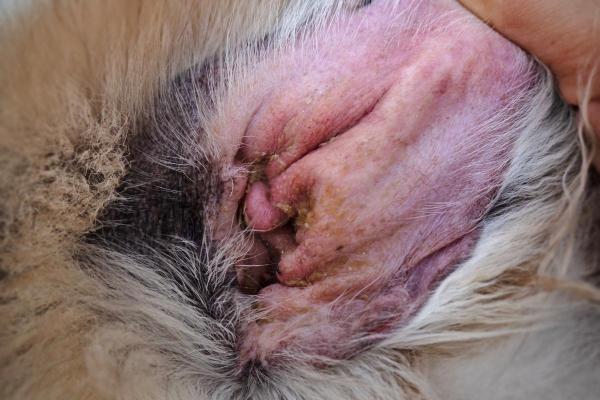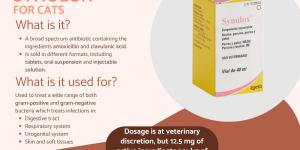Tylosin for Dogs - Tylan Powder and Injection



See files for Dogs
Sold under the brand name Tylan, tylosin is an antibiotic from the macrolide group that is commonly used to treat infections in veterinary medicine. It is widely used for livestock in agriculture such as pigs, chickens and cows, but it is also increasingly used in domestic animals. It has been shown to be effective in treating numerous infections, including respiratory infections, otitis and chronic enteropathies (pathologies affecting the small intestine). It has other uses, but these will be determined by the veterinarian.
At AnimalWised, we look more closely at tylosin for dogs. We discover the uses, dosage, side effects and more for Tylan powder and injections.
What is tylosin for dogs?
Tylosin is an antibiotic from the macrolide group that acts as a bacteriostatic at normal doses. This means that it stalls bacterial activity, without necessarily causing the death of the pathogen. It acts as a bactericide at high doses, meaning that it will kill the pathogen.
The preparations of tylosin for veterinary use are in the following forms:
- Tylosin powder: an oral preparation which has an astringent taste so it may be put into gel capsules.
- Tylosin injectable solution: usually only provided by the veterinarian in the clinic.
Brand name, preparation and availability can vary according to the country. In above preparations are available in the United States, but some European countries only allow for tylosin injections used in a clinical setting. Brand names other than Tylan include Tylocine.
Cost of tylosin for dogs
As with preparation availability and brand names, the cost of tylosin will depend on the market. In the US, 100 g of Tylan oral solution powder can range from $50 to $100.
Composition of tylosin for dogs
In the previous section we have said that tylosin is a macrolide antibiotic. More specifically, it is a mixture of macrolide antibiotics produced by strains of the Streptomyces fradiae bacterium. Specifically, tylosin is made up of the following macrolides:
- Tylosin A: whose content must not be less than 80%.
- Tylosin B: or desmycosin.
- Tylosin C: or macrocin.
- Tylosin D: or relomycin.
The active ingredient if tylosin which acts as a bactericide or bacteriostatic is tlyosin tartrate which is used in Tylan powder for dogs, as an injectable solution. Tylosin phosphate is used in agriculture as a feed to promote growth in livestock. The active tylosin ingredient is accompanied by a series of excipients in its injectable form which include:
- Benzyl alcohol
- Propylene glycol
- Water
Tylosin in oral solution powder does not have any listed excipients[1], so you will need to read the package for your particular brand.
Tylosin for dogs uses
Now that we know what it is, you may be wondering what are the uses of tylosin for dogs. As a broad-spectrum antibiotic that is effective in treating infections caused by:
- Gram negative aerobic bacteria: such as Mannheimia haemolytica and Pasteurella multocida.
- Gram positive facultative anaerobic bacteria: such as Arcanobacterium pyogenes.
- Gram negative anaerobic bacteria: such as Fusobacterium necrophorum.
- Bacteria without a cell wall: such as Mycoplasmas.
Specifically, tylosin for dogs is indicated to treat respiratory infections and otitis in dogs. In addition, it is a medicine frequently used for the treatment of chronic enteropathies. Can be used to treat diarrhea in dogs caused by intestinal enteropathies.

Is Tyalan for dogs used off label?
Many medications for veterinary use do not have the same FDA approval as human medications. Some drugs have been shown to be effective and are allowed to be used thanks to the extra-label use rule (US). This is a drug that is used in a way that is not indicated by the approved labeling, but does not contravene the regulations set out by the Animal Medicinal Drug Use Clarification Act of 1994 (AMDUCA) and U.S. Food and Drug Administration (FDA)[2].
One of the common off-label uses of tylosin is to remove the tear stains around the eyes of dogs. This is an off-label use, but it is not common. It is usually a last resort by veterinarians for dogs that have this problem chronically and it is affecting their quality of life.
Tylosin dosage for dogs
As we have mentioned, the injection of Tylan for dogs should only be administered by the veterinarian in a clinical setting. This is an intramuscular injection which has the following dosage for dogs:
- 7-11 mg of tylosin per kg of dog's weight administered once every 24 hours
The duration of the treatment will depend on the dog's response and other factors, but generally lasts between 3 and 5 days to counteract a bacterial infection.
The dosage of tylosin powder for dogs in oral form will depend on the cause. This will be determined by the veterinarian. For problems such as diarrhea in dogs, dosage can range from between 5 mg/kg to 25 mg/kg, usually administered over a period of 7 days.
Tylosin powder has an astringent flavor which can make administration difficult. It can be given with or without food. Many people will place it in gel capsules to make it easier for the dog to swallow without rejecting the medication.
Side effects of tylosin for dogs
The use of any medication carries with it a risk-benefit ratio. The benefit is the desired pharmacological effect, while the risk is the possible appearance of side effects. As with any medication, tylosin is not exempt from causing adverse reactions in certain circumstances:
- Local reaction at the injection site with necrosis, hemorrhage and conjunctival neoformation 6 days after injection.
- Edema of the rectal and/or vulvar mucosa
- Rectal prolapse
- Diarrhea
- Erythema (redness of the skin)
- Pruritus or generalized itching
- Petechiae on the skin (small pinpoint hemorrhages)
Learn how to avoid injection site reactions in dogs with our guide to giving a dog a shot under the skin.
Contraindications of tylosin for dogs
Although tylosin for dogs is a generally safe medication, there are certain situations in which its use may be contraindicated:
- Dogs with allergy or hypersensitivity to tylosin, to other macrolides or to any of its excipients.
- Infections by bacteria that have developed resistance to the effect of other macrolides.
- Pregnancy and lactation since the safety of the drug has not been demonstrated during these physiological states.
- Treatment with other bactericidal antibiotics.
Once again, we insist on the importance of using this medicine only if the veterinarian has prescribed it. Always following its instructions closely for use. Do not self-medicate your dog, especially with drugs that have not been specifically prescribed for your dog.
Learn about other types of antibiotics for dogs with our articles on tobramycin for dogs and bactrim for dogs which also detail their uses, dosage and side effects.
This article is purely informative. AnimalWised does not have the authority to prescribe any veterinary treatment or create a diagnosis. We invite you to take your pet to the veterinarian if they are suffering from any condition or pain.
If you want to read similar articles to Tylosin for Dogs - Tylan Powder and Injection, we recommend you visit our Medicine category.
1. Department for Environment, Food & Rural Affairs. (2020). Tylosin - Summary of Product Characteristics. Retrieved from:
https://www.vmd.defra.gov.uk/productinformationdatabase/files/SPC_Documents/SPC_140142.PDF
2. American Veterinary Medical Association. (n.d.). Extralabel Drug Use and AMDUCA: FAQ. Retrieved from:
https://www.avma.org/extralabel-drug-use-and-amduca-faq






